Charles E W Bean, Diaries, AWM38 3DRL 606/268/1 - 1917 - 1936 - Part 8
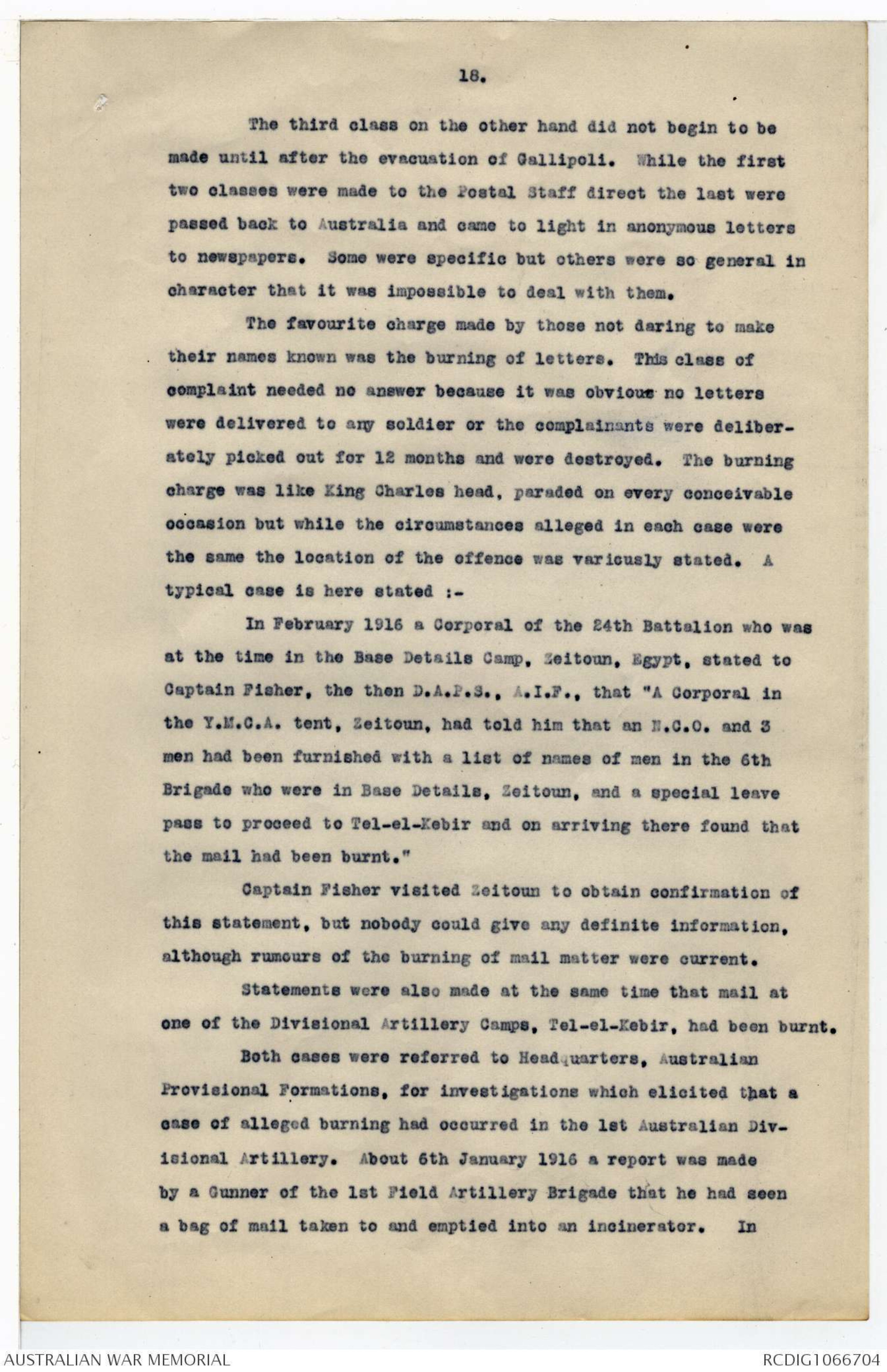
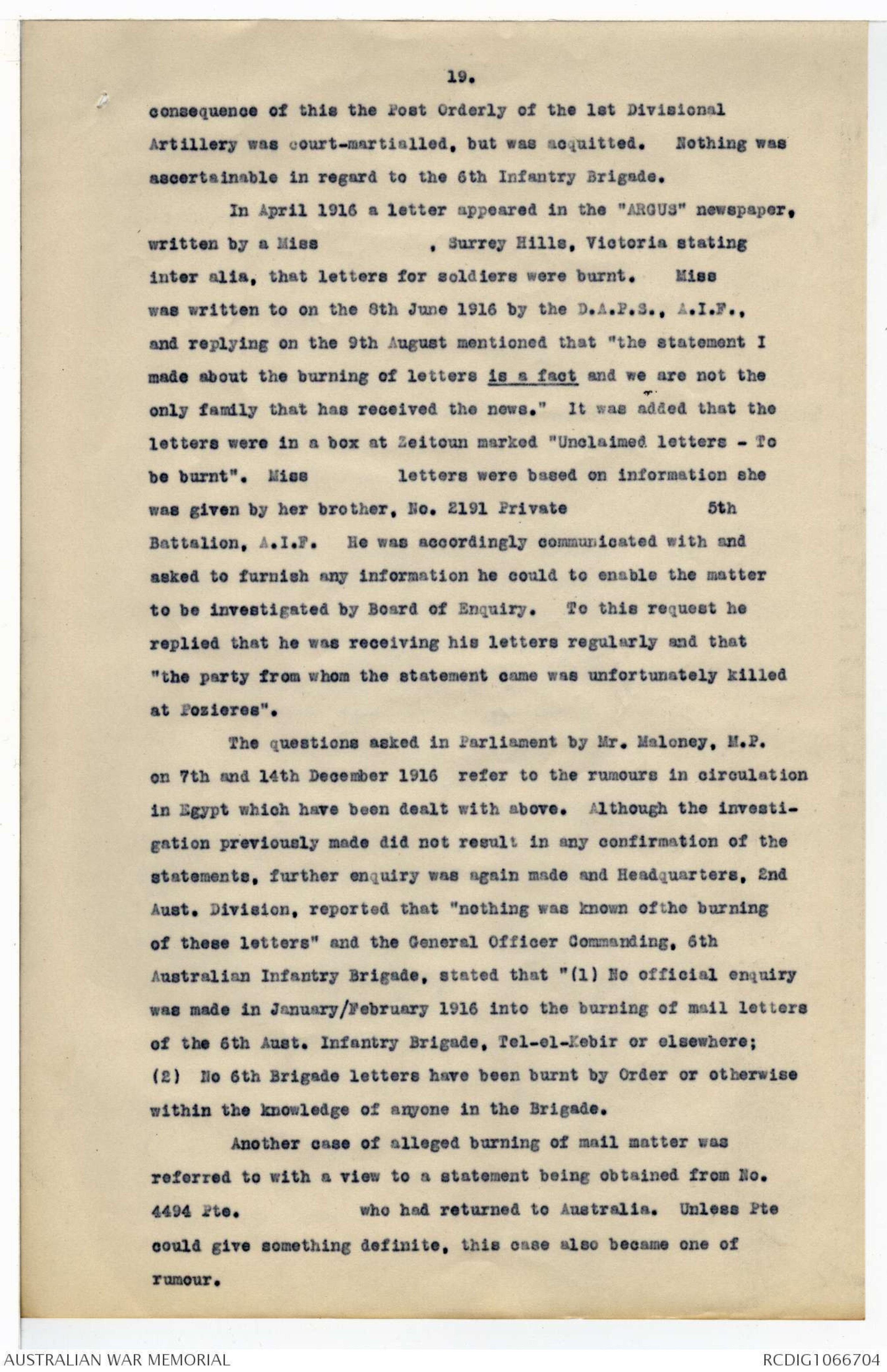
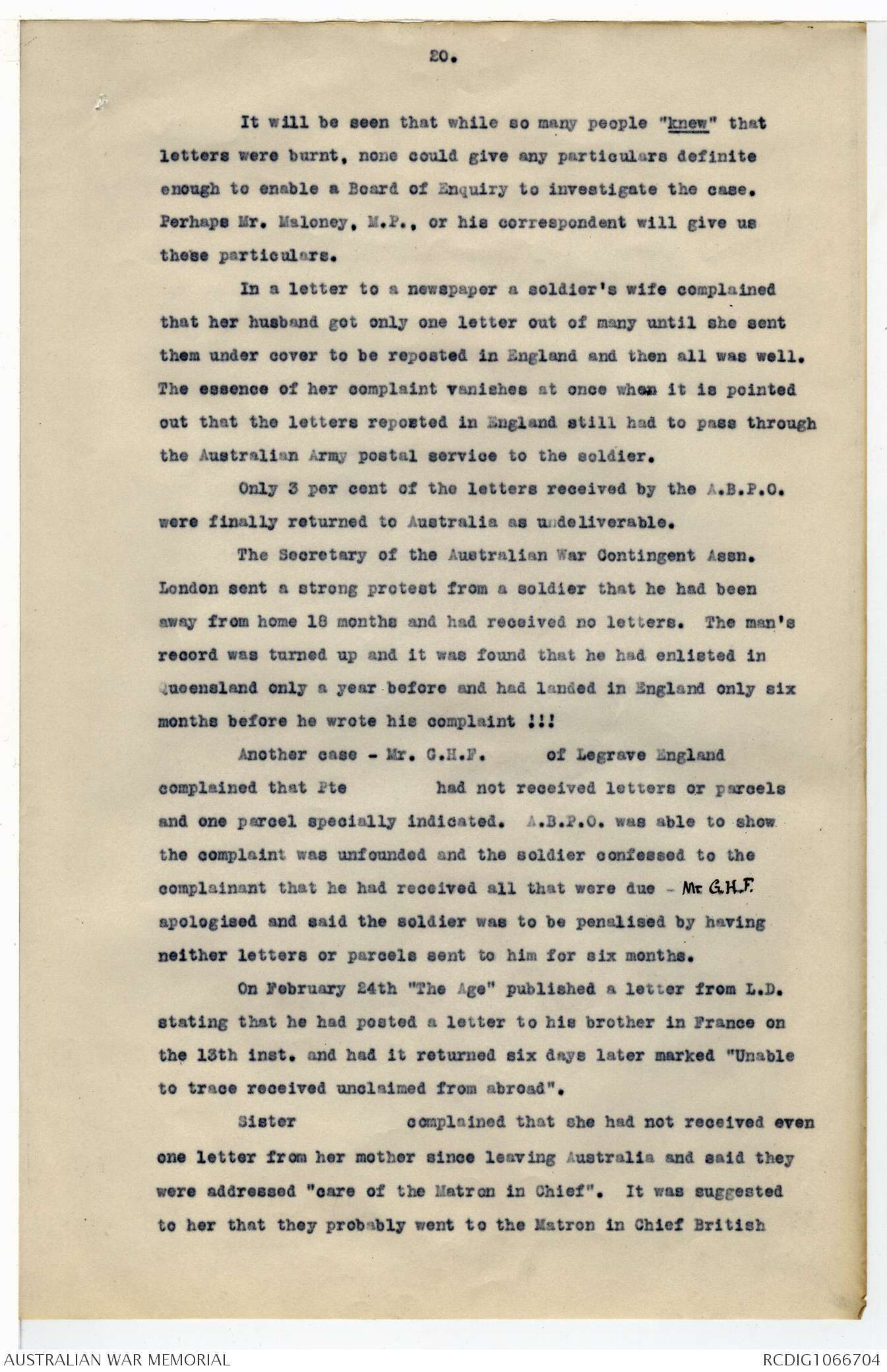
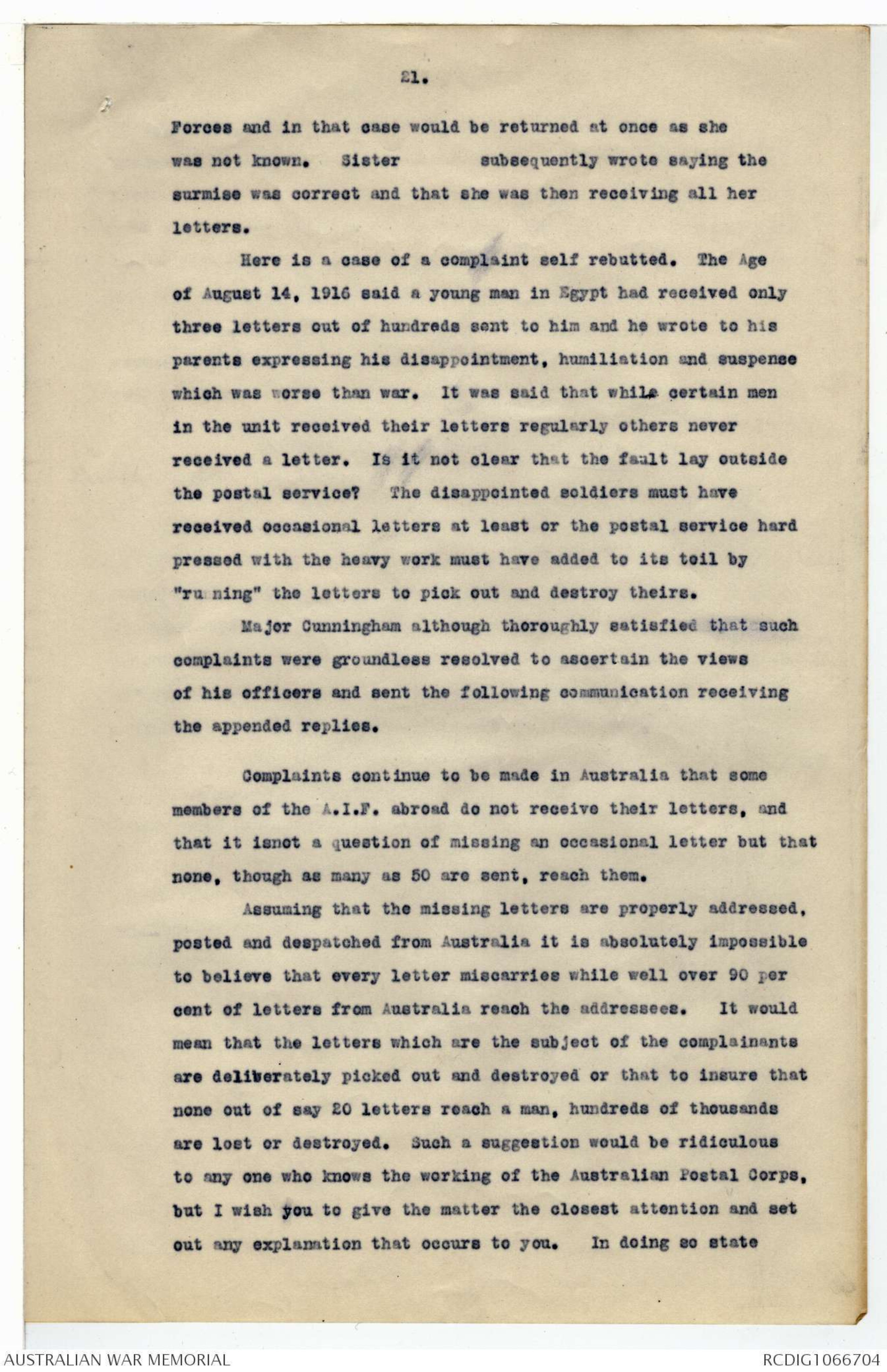
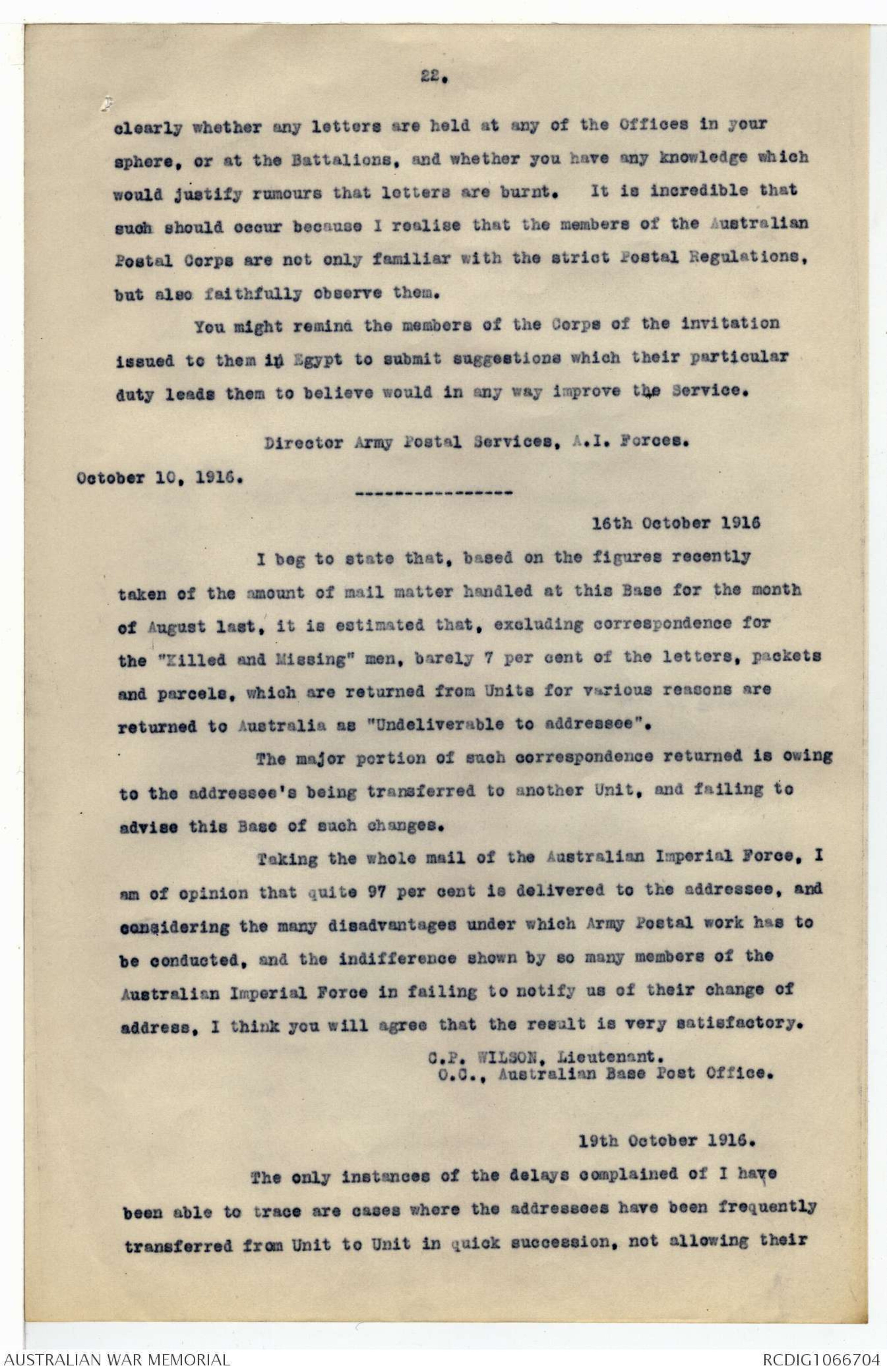
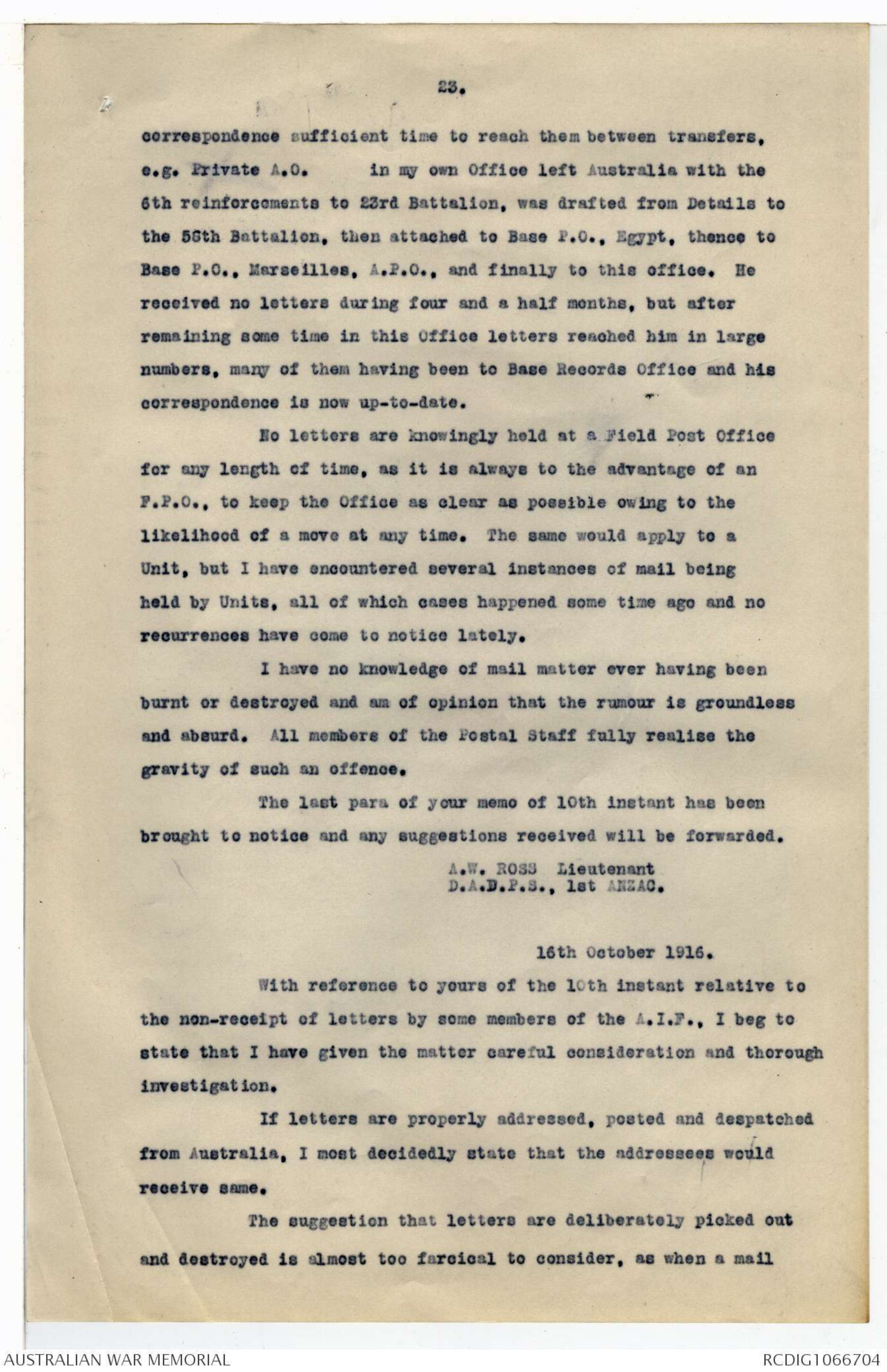
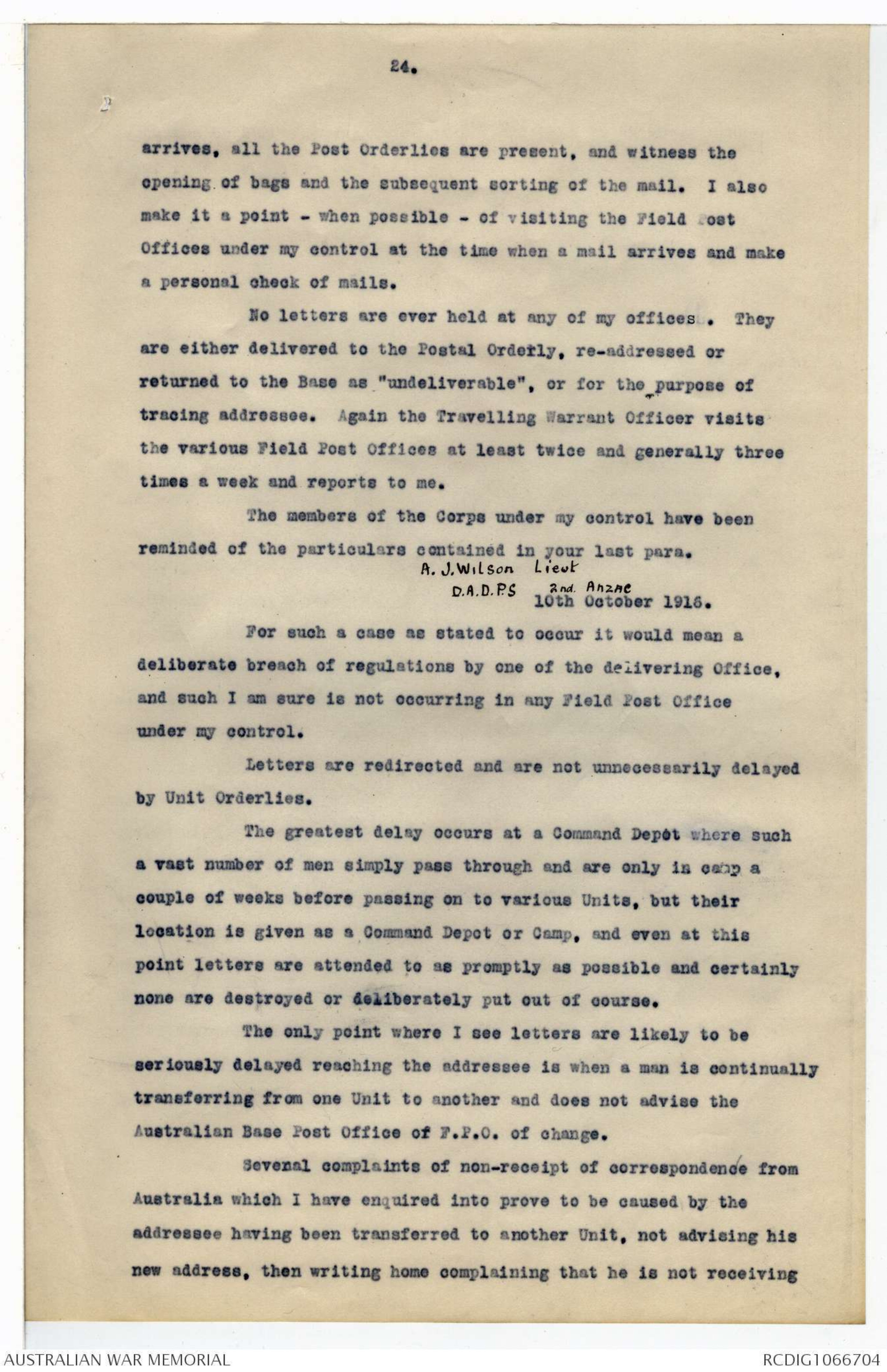
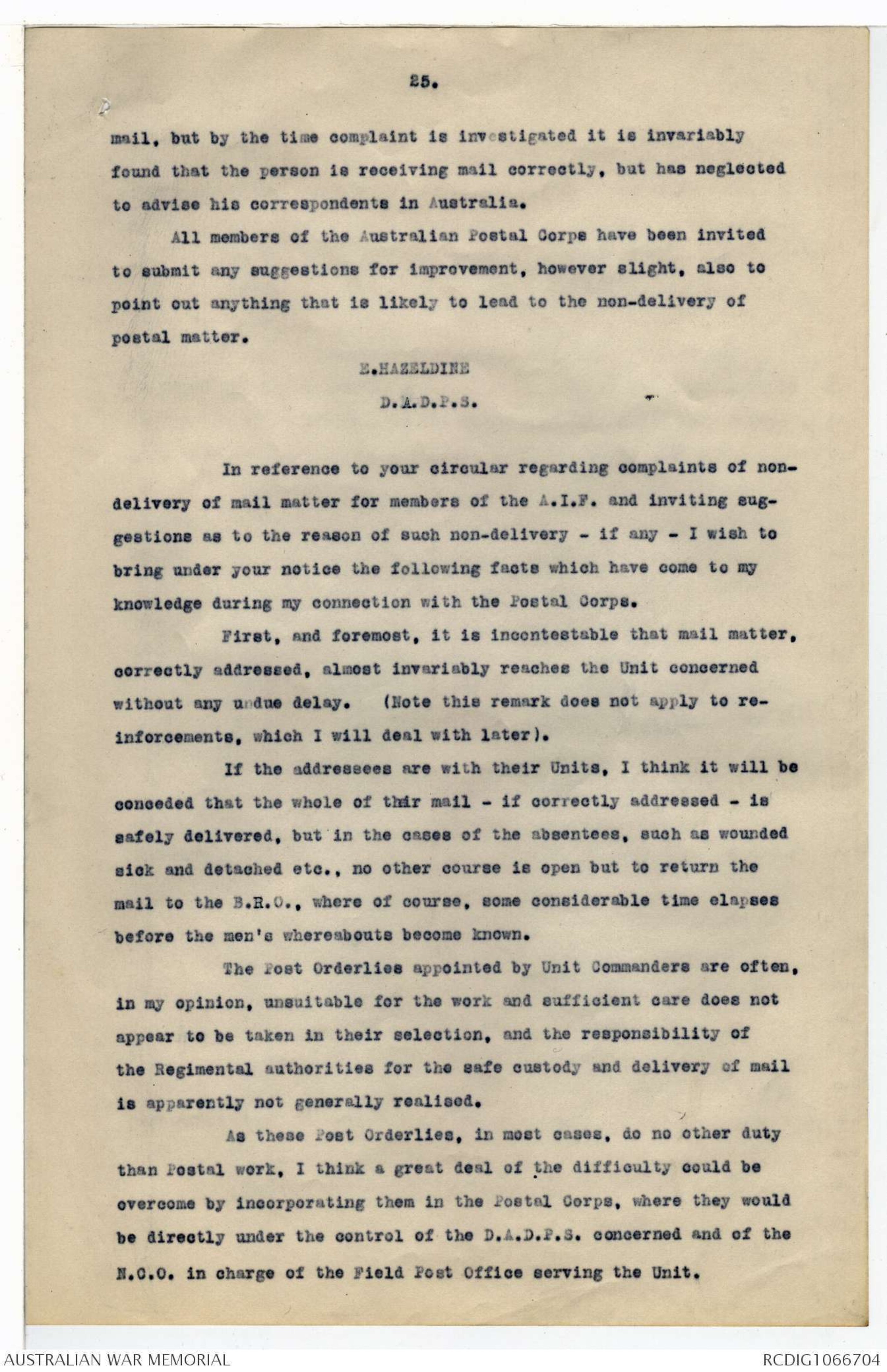
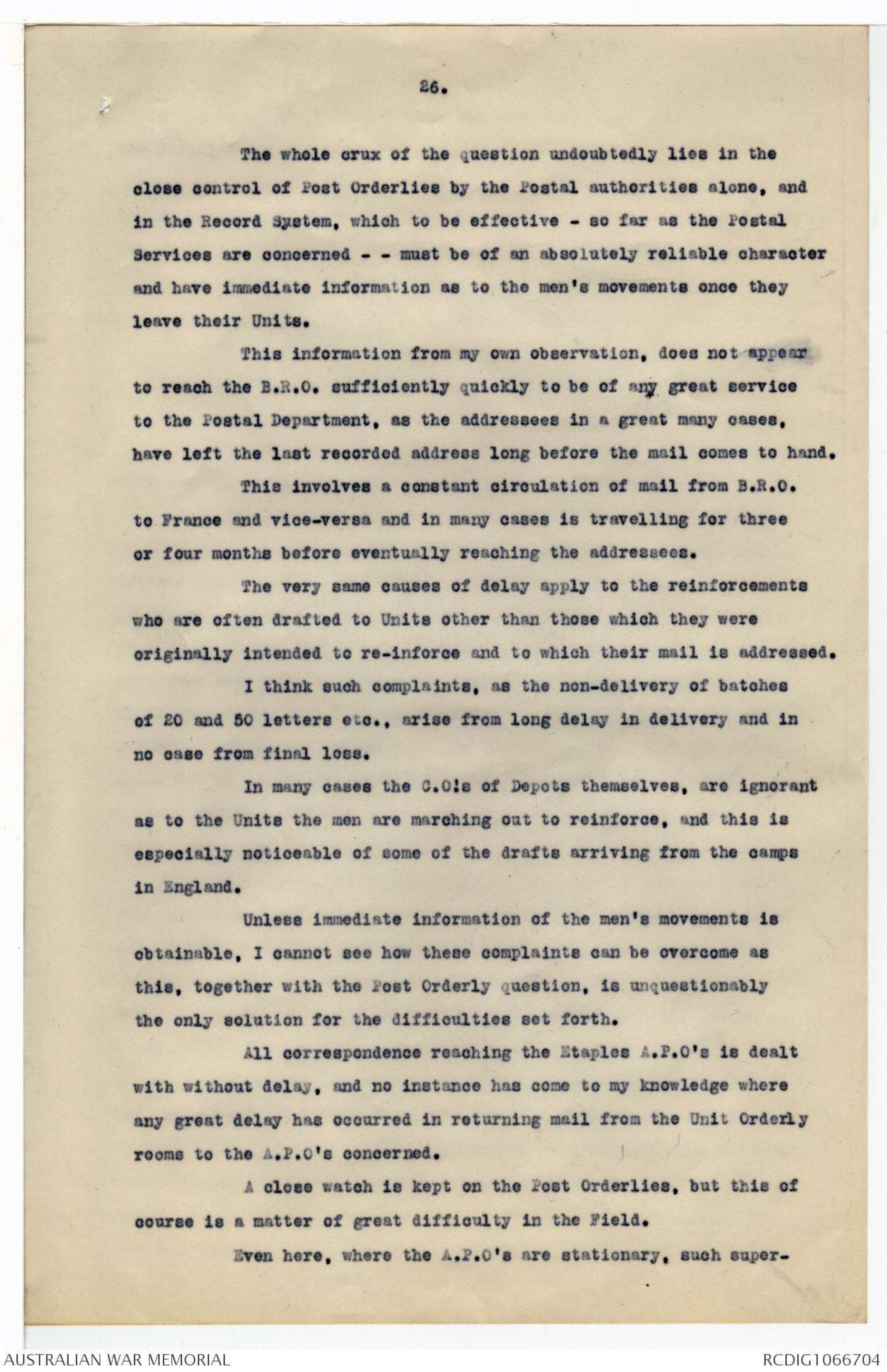
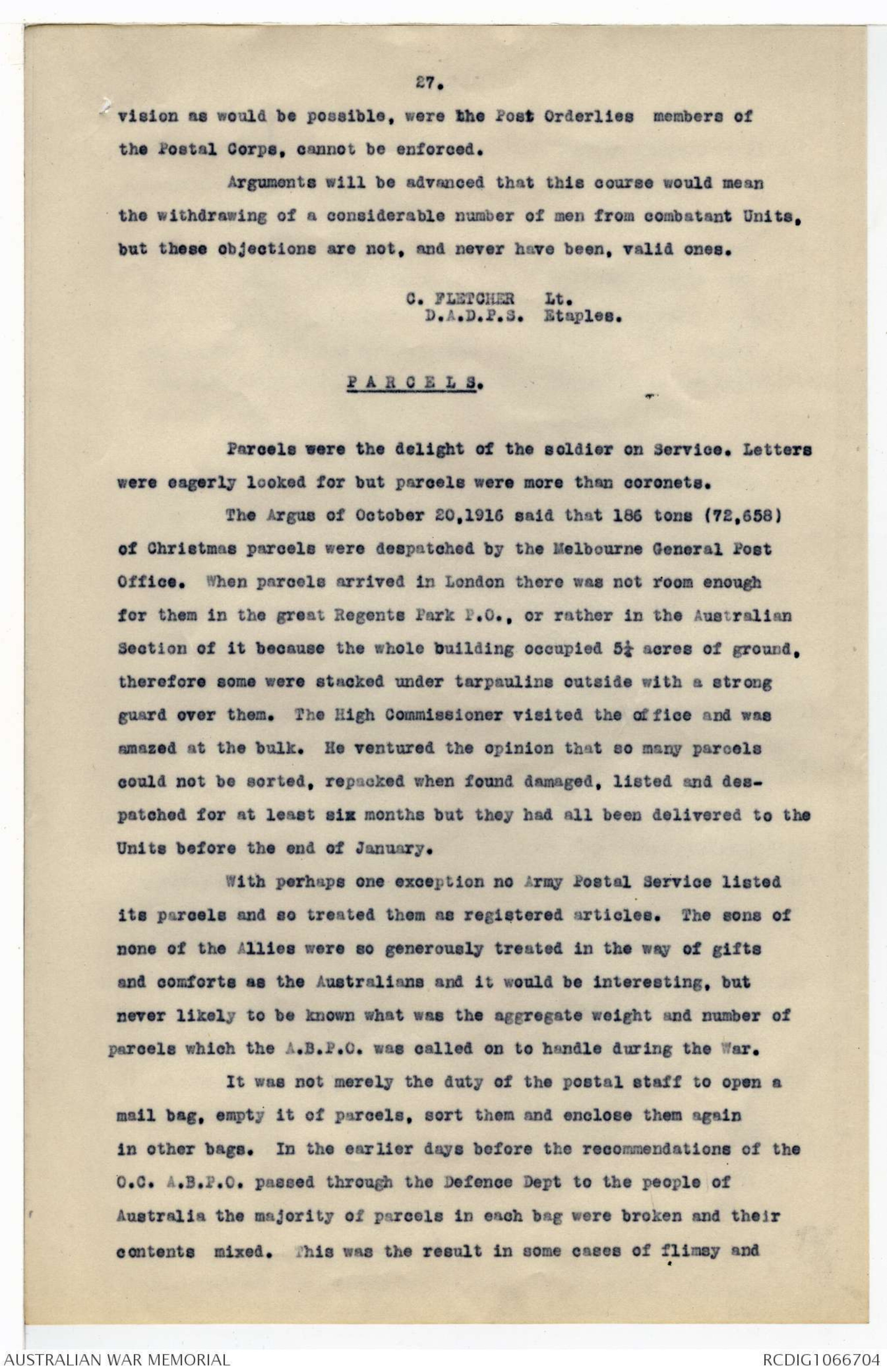
18.
The third class on the other hand did not begin to be
made until after the evacuation of Gallipoli. While the first
two classes were made to the Postal Staff direct the last were
passed back to Australia and came to light in anonymous letters
to newspapers. Some were specific but others were so general in
character that it was impossible to deal with them.
The favourite charge made by those not daring to make
their names known was the burning of letters. This class of
complaint needed no answer because it was obvious no letters
were delivered to any soldier or the complainants were deliberately
picked out for 12 months and were destroyed. The burning
charge was like King Charles head, paraded on every conceivable
occasion but while the circumstances alleged in each case were
the same the location of the offence was variously stated. A
typical case is here stated :-
In February 1916 a Corporal of the 24th Battalion who was
at the time in the Base Details Camp, Seitoun, Egypt, stated to
Captain Fisher, the then D.A.P.S., A.I.F., that "A Corporal in
the Y.M.C.A. tent, Zeitoun, had told him that an N.C.O. and 3
men had been furnished with a list of names of men in the 6th
Brigade who were in Base Details, Zeitoun, and a special leave
pass to proceed to Tel-el-Kebir and on arriving there found that
the mail had been burnt."
Captain Fisher visited Zeitoun to obtain confirmation of
this statement, but nobody could give any definite informoation,
although rumours of the burning of mail matter were current.
Statements were also made at the same time that mail at
one of the Divisional Artillery Camps, Tel-el-Kabir, had been burnt.
Both cases were referred to Headquarters, Australian
Provisional Formations, for investigations which elicited that a
case of alleged burning had occurred in the 1st Australian Divisional
Artillery. About 6th January 1916 a report was made
by a Gunner of the 1st Field Artillery Brigade that he had seen
a bag of mail taken to and emptied into an incinerator. In
19.
consequence of this the Post Orderly of the 1st Divisional
Artillery was court-martialled, but was acquitted. Nothing was
ascertainable in regard to the 6th Infantry Brigade.
In April 1916 a letter appeared in the "ARGUS" newspaper,
written by a Miss , Surrey Hills, Victoria stating
inter alia, that letters for soldiers were burnt. Miss
was written to on the 8th June 1916 by the D.A.P.S., A.I.F.,
and replying on the 9th August mentioned that "the statement I
made about the burning of letters is a fact and we are not the
only family that has received the news." It was added that the
letters were in a box at Zeitoun marked "Unclaimed letters - To
be burnt". Miss letters were based on information she
was given by her brother, No. 2191 Private 5th
Battalion, A.I.F. He was accordingly communicated with and
asked to furnish any information he could to enable the matter
to be investigated by Board of Enquiry. To this request he
replied that he was receiving his letters regularly and that
"the part from whom the statement came was unfortunately killed
at Pozieres".
The questions asked in Parliament by Mr. Maloney, M.P.
on 7th and 14th December 1916 refer to the rumours in circulation
in Egypt which have been dealt with above. Although the investigation
previously made did not result in any confirmation of the
statements, further enquiry was again made and Headquarters, 2nd
Aust. Division, reported that "nothing was known ofthe burning
of these letters" and the General Officer Commanding, 6th
Australian Infantry Brigade, stated that "(1) No official enquiry
was made in January/February 1916 into the burning of mail letters
of the 6th Aust. Infantry Brigade, Tel-el-Kabir or elsewhere;
(2) No 6th Brigade letters have been burnt by Order or otherwise
within the knowledge of anyone in the Brigade.
Another case of alleged burning of mail matter was
referred to with a view to a statement being obtained from No.
4494 Pte. who had returned to Australia. Unless Pte
could give something definite, this case also became one of
rumour.
20.
It will be seen that whils so many people "knew" that
letters were burnt, none could give any particulars definite
enough to enable a Board of Enquiry to investigate the case.
Perhaps Mr. Maloney, M.P., or his correspondent will give us
these particulars.
In a letter to a newspaper a soldier's wife complained
that her husband got only one letter out of many until she sent
them under cover to be reposted in England and then all was well.
The essence of her complaint vanishes at once when it is pointed
out that the letters reposted in England still had to pass through
the Australian Army postal service to the soldier.
Only 3 per cent of the letters received by the A.B.P.O.
were finally returned to Australia as undeliverable.
The Secretary of the Australian War Contingent Assn.
London sent a strong protest from a soldier that he had been
away from home 18 months and had received no letters. The men's
record was turned up and it was found that he had enlisted in
Queensland only a year before and had landed in England only six
months before he wrote his complaint !!!
Another case - Mr. G.H.F. of Legrave England
complained that Pte had not received letters or parcels
and one parcel specially indicated. A.B.P.O. was able to show
the complaint was unfounded and the soldier confessed to the
complainant that he had received all that were due - Mr G.H.F.
apologised and said the soldier was to be penalised by having
neither letters or parcels sent to him for six months.
On February 24th "The Age" published a letter from L.D.
stating that he had posted a letter to his brother in France on
the 13th inst. and had it returned six days later marked "Unable
to trace received unclaimed from abroad".
Sister complained that she had not received even
one letter from her mother since leaving Australia and said they
were addressed "care of the Matron in Chief". It was suggested
to her that they probably went to the Matron in Chief British
21.
Forces and in that case would be returned at once as she
was not known. Sister subsequently wrote saying the
surmise was correct and that she was then receiving all her
letters.
Here is a case of a complaint self rebutted. The Age
of August 14, 1916 said a young man in Egypt had received only
three letters out of hundreds sent to him and he wrote to his
parents expressing his disappointment, humiliation and suspense
which was worse than war. It was said that while certain men
in the unit received their letters regularly others never
received a letter. Is it not clear that the fault lay outside
the postal service? The disappointed soldiers must have
received occasional letters at least or the postal service hard
pressed with the heavy work must have added to its toil by
"running" the letters to pick out and destroy theirs.
Major Cunningham although thoroughly satisfied that such
complaints were groundless resolved to ascertain the views
of his officers and sent the following communication receiving
the appended replies.
Complaints continue to be made in Australia that some
members of the A.I.F. abroad do not receive their letters, and
that it isnot a question of missing an occasional letter but that
none, though as many as 50 are sent, reach them.
Assuming that the missing letters are properly addressed,
posted and despatched from Australia it is absolutely impossible
to believe that every letter miscarries while well over 90 per
cent of letters from Australia reach the addressees. It would
mean that the letters which are the subject of the complainants
are deliberately picked out and destroyed or that to insure that
none out of say 20 letters reach a man, hundreds of thousands
are lost or destroyed. such a suggestion would be ridiculous
to any one who knows the working of the Australian Postal Corps,
but I wish you to give the matter the closest attention and set
out any explanation that occurs to you. In doing so state
22.
clearly whether any letters are held at any of the Offices in your
sphere, or at the Battalions, and whether you have any knowledge which
would justify rumours that letters are burnt. It is incredible that
such should occur because I realise that the members of the Australian
Postal Corps are not only familiar with the strict Postal Regulations,
but also faithfully observe them.
You might remind the members of the Corps of the invitation
issued to them in Egypt to submit suggestions which their particular
duty leads them to believe would in any way improve the Service.
Director Army Postal Services, A.I. Forces.
October 10, 1916.
16th October 1916
I beg to state that, based of the figures recently
taken of the amount of mail matter handled at this Base for the month
of August last, it is estimated that, excluding correspondence for
the "Killed and Missing" men, barely 7 per cent of the letters, packets
and parcels, which are returned from Units for various reasons are
returned to Australia as "Undeliverable to addressee".
The major portion of such correspondence returned is owing
to the addressee's being transferred to another Unit, and failing to
advise this Base of such changes.
Taking the whole mail of the Australian Imperial Force, I
am of opinion that quite 97 per cent is delivered to the addressee, and
considering the many disadvantages under which Army Postal work has to
be conducted, and the indifference shown by so many members of the
Australian Imperial Force in failing to notify us of their change of
address, I think you will agree that the result is very satisfactory.
C.P. WILSON, Lieutenant.
O.C., Australian Base Post Office.
19th October 1916.
The only instances of the delays complained of I have
been able to trace are cases where the addressees have been frequently
transferred from Unit to Unit in quick succession, not allowing their
23.
correspondence sufficient time to reach them between transfers,
e.g. Private A.O. in my own Office left Australia with the
6th reinforcements to 23rd Battalion, was drafted from Details to
the 58th Battalion, then attached to Base P.O., Egypt, thence to
Base P.O., Marseilles, A.P.O., and finally to this office. He
received no letters during four and a half months, but after
remaining some time in this Office letters reached him in large
numbers, many of them having been to Base Records Office and his
correspondence is now up-to-date.
No letters are knowingly held at a Field Post Office
for any length of time, as it is always to the advantage of an
F.P.O., to keep the Office as clear as possible owing to the
likelihood of a move at any time. The same would apply to a
Unit, but I have encountered several instances of mail being
held by Units, all of which cases happened some time ago and no
recurrences have come to notice lately.
I have no knowledge of mail matter ever having been
burnt or destroyed and am of opinion that the rumour is groundless
and absurd. All members of the Postal Staff fully realise the
gravity of such an offence.
The last para of your memo of 10th instant has been
brought to notice and any suggestions received will be forwarded.
A.W. ROSS Lieutenant
D.A.D.P.S., 1st ANZAC.
16th October 1916.
With reference to yours of the 10th instant relative to
the non-receipt of letters by some members of the A.I.F., I beg to
state that I have given the matter careful consideration and thorough
investigation.
If letters are properly addressed, posted and despatched
from Australia, I most decidedly state that the addressees would
receive same.
The suggestion that letters are deliberately picked out
and destroyed is almost too farcical to consider, as when a mail
24.
arrives, all the Post Orderlies are present, and witness the
opening of bags and the subsequent sorting of the mail. I also
make it a point - when possible - of visiting the Field Post
Offices under my control at the time when a mail arrives and make
a personal check of mails.
No letters are ever held at any of my offices . They
are either delivered to the Postal Orderly, re-addressed or
returned to the Base as "undeliverable", or for the purpose of
tracing addressee. Again the Travelling Warrant Officer visits
the various Field Post Offices at least twice and generally three
times a week and reports to me.
The members of the Corps under my control have been
reminded of the particulars contained in your last para.
A.J. Wilson Lieut
D.A.D.P.S 2nd ANZAC
10th October 1916.
For such a case as stated to occur it would mean a
deliberate breach of regulations by one of the delivering Office,
and such I am sure is not occurring in any Field Post Office
under my control.
Letters are redirected and are not unnecessarily delayed
by Unit Orderlies.
The greatest delay occurs at a Command Depot where such
a vast number of men simply pass through and are only in camp a
couple of weeks before passing on to various Units, but their
location is given as a Command Depot or Camp, and even at this
point letters are attended to as promptly as possible and certainly
none are destroyed or deliberately put out of course.
The only point where I see letters are likely to be
seriously delayed reaching the addressee is when a man is continually
transferring from one Unit to another and does not advise the
Australian Base Post Office of F.P.O. of change.
Several complaints on non-receipt of correspondence from
Australia which I have enquired into prove to be caused by the
addressee having been transferred to another Unit, not advising his
new address, then writing home complaining that he is not receiving
25.
mail, but by the time complaint is investigated it is invariably
found that the person is receiving mail correctly, but has neglected
to advise his correspondents in Australia.
All members of the Australian Postal Corps have been invited
to submit any suggestions for improvement, however slight, also to
point out anything that is likely to lead to the non-delivery of
postal matter.
E.HAZELDINE
D.A.D.P.S.
In reference to your circular regarding complaints of non-
delivery of mail matter for members of the A.I.F. and inviting suggestions
as to the reason of such non-delivery - if any - I wish to
bring under your notice the following facts which have come to my
knowledge during my connection with the Postal Corps.
First, and foremost, it is incontestable that mail matter,
correctly addressed, almost invariably reaches the Unit concerned
without any undue delay. (note this remark does not apply to reinforcements,
which I will deal with later).
If the addressees are with their Units, I think it will be
conceded that the whole of their mail - if correctly addressed - is
safely delivered, but in the cases of the absentees, such as wounded
sick and detached etc., no other course is open but to return the
mail to the B.R.O., where of course, some considerable time elapses
before the men's whereabouts become known.
The Post Orderlies appointed by Unit Commanders are often,
in my opinion, unsuitable for the work and sufficient care does not
appear to be taken in their selection, and the responsibility of
the Regimental authorities for the safe custody and delivery of mail
is apparently not generally realised.
As these Post Orderlies, in most cases, do no other duty
than Postal work, I think a great deal of the difficulty could be
overcome by incorporating them in the Postal Corps, where they would
be directly under the control of the D.A.D.P.S. concerned and of the
N.C.O. in charge of the Field Post Office serving the Unit.
26.
The whole crux of the question undoubtedly lies in the
close control of Post Orderlies by the Postal authorities alone, and
in the Record System, which to be effective - so far as the Postal
Services are concerned - - must be of an absolutely reliable character
and have immediate information as to the men's movements once they
leave their Units.
This information from my own observation, does not appear
to reach the B.R.O. sufficiently quickly to be of any great service
to the Postal Department, as the addressees in a great many cases,
have left the last recorded address long before the mail comes to hand.
This involves a constant circulation of mail from B.R.O.
to France and vice-versa and in many cases is travelling for three
or four months before eventually reaching the addressees.
The very same causes of delay apply to the reinforcements
who are often drafted to Units other than those which they were
originally intended to re-inforce and to which their mail is addressed.
I think such complaints, as the non-delivery of batches
of 20 and 50 letters etc., arise from long delay in delivery and in
no case from final loss.
In many cases the C.O!sof Depots themselves, are ignorant
as to the Units the men are marching out to reinforce, and this is
especially noticeable of some of the drafts arriving from the camps
in England.
Unless immediate information of the men's movements is
obtainable, I cannot see how these complaints can be overcome as
this, together with the Post Orderly question, is unquestionably
the only solution for the difficulties set forth.
All correspondence reaching the Etaples A.P.O's is dealt
with without delay, and no instance has come to my knowledge where
any great delay has occurred in returning mail from the Unit Orderly
rooms to the A.P.O's concerned.
A close watch is kept on the Post Orderlies, but this of
course is a matter of great difficulty in the Field.
Even here, where the A.P.O's are stationary, such super-
27.
vision as would be possible, were the Post Orderlies members of
the Postal Corps, cannot be enforced.
Arguments will be advanced that his course would mean
the withdrawing of a considerable number of men from combatant Units,
but these objections are not, and never have been, valid ones.
C. FLETCHER Lt.
D.A.D.P.S. Etaples.
PARCELS.
Parcels were the delight of the soldier on Service. Letters
were eagerly looked for but parcels were more than coronets.
The Argus of October 20,1916 said that 186 tons (72,658)
of Christmas parcels were despatched by the Melbourne General Post
Office. When parcels arrived in London there was not room enough
for them in the great Regents Park P.O., or rather in the Australian
Section of it because the whole building occupied 5¼ acres of ground,
therefore some were stacked under tarpaulins outside with a strong
guard over them. The High Commissioner visited the office and was
amazed at the bulk. He ventured the opinion that so many parcels
could not be sorted, repacked when found damaged, listed and despatched
for at least six months but they had all been delivered to the
Units before the end of January.
With perhaps one exception no Army Postal Service listed
its parcels and so treated them as registered articles. The sons of
none of the Allies were so generously treated in the way of gifts
and comforts as the Australians and it would be interesting, but
never likely to be known what was the aggregate weight and number of
parcels which the A.B.P.O. was called on to handle during the War.
It was not merely the duty of the postal staff to open a
mail bag, empty it of parcels, sort them and enclose them again
in other bags. In the earlier days before the recommendations of the
O.C. A.B.P.O. passed through the Defence Dept to the people of
Australia the majority of parcels in each bag were broken and their
contents mixed. This was the result in some cases of flimsy and
 Sam scott
Sam scottThis transcription item is now locked to you for editing. To release the lock either Save your changes or Cancel.
This lock will be automatically released after 60 minutes of inactivity.